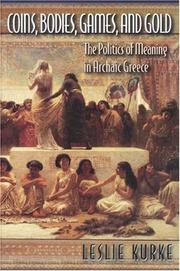| Listing 1 - 2 of 2 |
Sort by
|
Book
ISBN: 9892618173 9892618165 Year: 2019 Publisher: Coimbra University Press
Abstract | Keywords | Export | Availability | Bookmark
 Loading...
Loading...Choose an application
- Reference Manager
- EndNote
- RefWorks (Direct export to RefWorks)
The work focuses on the First European Civilisation, that of the Minoans, beginning with a brief chronological introduction and its most significant discoveries in archaeology. In the following chapters, the main palatial complexes and other habitats are described, framed within the so-called Cretan Thalassocracy in the Aegean. The work continues with religion, discussing its cults and rituals, as well as the different writing systems found on small clay tablets (hieroglyphic, linear A and B) and the enigmatic Phaistos Disc. In appendix, some records of Minoan art are presented, namely painting, pottery, glyptic art, jewellery and sculpture, as well as other miniature works.

ISBN: 0691007365 069101731X 9780691017310 9780691007366 Year: 1999 Publisher: Princeton (N.J.): Princeton university press
Abstract | Keywords | Export | Availability | Bookmark
 Loading...
Loading...Choose an application
- Reference Manager
- EndNote
- RefWorks (Direct export to RefWorks)
The invention of coinage in ancient Greece provided an arena in which rival political groups struggled to imprint their views on the world. Here Leslie Kurke analyzes the ideological functions of Greek coinage as one of a number of symbolic practices that arise for the first time in the archaic period. By linking the imagery of metals and coinage to stories about oracles, prostitutes, Eastern tyrants, counterfeiting, retail trade, and games, she traces the rising egalitarian ideology of the polis, as well as the ongoing resistance of an elitist tradition to that development. The argument thus aims to contribute to a Greek "history of ideologies," to chart the ways ideological contestation works through concrete discourses and practices long before the emergence of explicit political theory. To an elitist sensibility, the use of almost pure silver stamped with the state's emblem was a suspicious alternative to the para-political order of gift exchange. It ultimately represented the undesirable encroachment of the public sphere of the egalitarian polis. Kurke re-creates a "language of metals" by analyzing the stories and practices associated with coinage in texts ranging from Herodotus and archaic poetry to Aristotle and Attic inscriptions. She shows that a wide variety of imagery and terms fall into two opposing symbolic domains: the city, representing egalitarian order, and the elite symposium, a kind of anti-city. Exploring the tensions between these domains, Kurke excavates a neglected portion of the Greek cultural "imaginary" in all its specificity and strangeness.
Meaning (Psychology)
---
Coins, Greek
---
History
---
Greece
---
Antiquities
---
Civilization
---
History.
---
Antiquities.
---
To 146 B.C.
---
Psychology
---
Greek coins
---
Griechenland
---
Grèce
---
Hellas
---
Yaṿan
---
Vasileion tēs Hellados
---
Hellēnikē Dēmokratia
---
République hellénique
---
Royaume de Grèce
---
Kingdom of Greece
---
Hellenic Republic
---
Ancient Greece
---
Ελλάδα
---
Ellada
---
Ελλάς
---
Ellas
---
Ελληνική Δημοκρατία
---
Ellēnikē Dēmokratia
---
Elliniki Dimokratia
---
Grecia
---
Grčija
---
Hellada
---
اليونان
---
يونان
---
al-Yūnān
---
Yūnān
---
希腊
---
Xila
---
Греция
---
Gret︠s︡ii︠a︡
---
Social conditions
---
Meaning (Psychology) - Greece.
---
Coins, Greek - Greece - History.
---
Altertum
---
Ideologie
---
Sozialgeschichte
---
Kulturgeschichte
---
Geldgeschichte
---
Politik.
---
Münzbild.
---
Zivilisation
---
Geld
---
Kultur
---
Münzprägung
---
Griechenland.
---
Griechenland (Altertum)
---
Griechenland (altes)
---
Griechenland
| Listing 1 - 2 of 2 |
Sort by
|

 Search
Search Feedback
Feedback About UniCat
About UniCat  Help
Help News
News